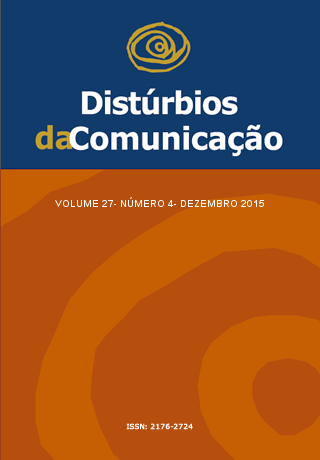Characterization and comparison of the acquisition of /k/ and /g/ and of [kw] and [gw] in cases of phonological disorder
Keywords:
Language Development, Speech, Articulation DisordersAbstract
Purpose: compare and characterize the acquisition of phonetic sequences [kw] and [gw] and plosives /k/ and /g/ in children with phonological disorders, considering linguistic and extralinguistic factors. Method: the sample was composed by 28 girls and 38 boys, aged between 5:0 and 8:0, with atypical phonological development. Analyzed a corpus of 2.205 Brazilian Portuguese words containing the phonetic sequences [kw] and [gw] and the phonemes /k/ and /g/. In the dependent variable was considered correct and incorrect production. The intervening variables were: sex, age, tonicity, number of syllables in the word, preceding syllable context, following syllable context, word position, sonority and segment complexity. It was used for statistical analysis the VARBRUL package, with a 5% of significance. Results: to the data of the /k/ and /g / phonemes, the program indicated as statistically significant the variables of age, number of syllables, word position and sonority. For [kw] and [gw] sequences, was selected only the variable of sonority. In round where data were considered in a single group (/k/ with /g/ + [kw] with [gw]), the variable complexity of the segment was selected as statistically significant, most likely to correct production of /k/ e /g/ phonemes. Conclusion: the /k/ and /g/ phonemes favored the correct production, indicating the hypothesis that [kw] and [gw] sequences may be regarded as complex segments of Brazilian Portuguese also in cases of phonological disorders.Downloads
Metrics
Downloads
Published
Issue
Section
License
Copyright (c) 2015 Silvana Gonçalves Lopes, Carolina Lisbôa Mezzomo, Roberta Freitas Dias, Diéssica Zacarias Vargas, Carolina Ramos de Freitas

This work is licensed under a Creative Commons Attribution 4.0 International License.









